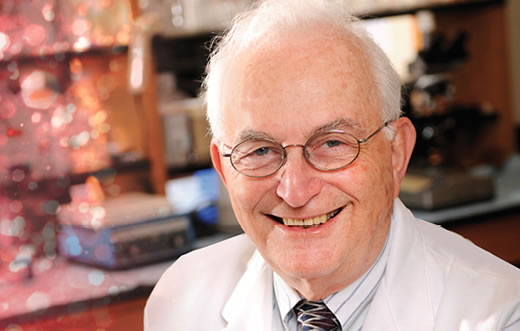If Don Stein were the kind of man who listened to what others said, he would have shut down his lab years ago. The Emory neuroscientist spent more than two decades investigating progesterone as a treatment for traumatic brain injury (TBI) — a pursuit that was unappreciated at best and maligned at worst. A naturally occurring hormone was too simple a solution to too complex a problem, according to the prevailing wisdom.
Today Stein stands if not on the threshold of vindication, at least within the general neighborhood. After better-than-hoped-for results from the first human trial, progesterone is being tested in two nationwide phase 3 trials and also internationally in more than 20 countries.
And Stein is now expanding his scope to test whether progesterone can work its magic in other conditions, such as stroke, pediatric TBI and brain tumors.
"I've spent most of my professional career pursuing this line of work," says Stein, Asa Candler Professor of Emergency Medicine and director of the department's Brain Research Laboratory. "Seeing our work in worldwide clinical trial is exciting, but what would really be gratifying would be to know that the work we did actually ended up helping a lot of people to live more healthy and fulfilling lives."
A positive outcome from the trial could mean just that. Researchers have tried unsuccessfully for decades to develop an acute treatment for TBI.
"The graveyard for drugs and promising therapies for TBI is extensive," says David Wright, associate professor in emergency medicine. "There have been many attempts, but zero have made it past a phase 3 clinical trial in something that is epidemic in this country."
All those failures stemmed from looking at the problem the wrong way, contends Stein. "One of the main reasons every single drug has failed is the persistent approach to target one gene, one pathway, one receptor, thinking you are going to find a magic bullet to treat a very, very complex disorder," says Stein.
Indeed, with TBI the initial injury is just the beginning. Even a very localized trauma results in a cascading release of inflammatory factors that cause swelling, tissue breakdown and programmed cell death. "When you have a brain injury, you have a systemic disease," says Stein. "Every organ in the body is affected. So if you are just treating one spot in the brain or one pathway, you're going to fail."
 | |
| Donald Stein, PhD |
Progesterone, on the other hand, works at multiple genes, multiple pathways, and multiple receptors. Not only is it able to stem the devastating inflammatory cascade, it actually helps repair the damage. "If you tear down a building, are you just going to leave the rubble?" says Stein. "No, you're going to clear it away and rebuild. That's where progesterone shines. It's a developmental hormone that is involved through the entire gestation of the fetus. So here you have an agent that not only blocks all these toxic events, but it also stimulates regenerative repair."
Progesterone certainly took a step toward proving its worth in the small 100-patient phase 2 trial. Stein and his team were merely hoping to demonstrate that the high dose of the hormone used was safe, so they could proceed to a larger trial. Any evidence of efficacy would be gravy. They got gravy.
"Much to our surprise, we saw a 50 percent reduction in death in the treatment group, which was just over the top," says Wright. "And in a certain subgroup, we also saw functional improvement. That shifted the whole curve from keeping people alive to actually making them better."
For Stein, applying these positive findings to other conditions only makes sense. "Everything we do has to do with brain injury," he says. "Whether it's from a head trauma, a stroke or a tumor, it's still an injury to the brain."

